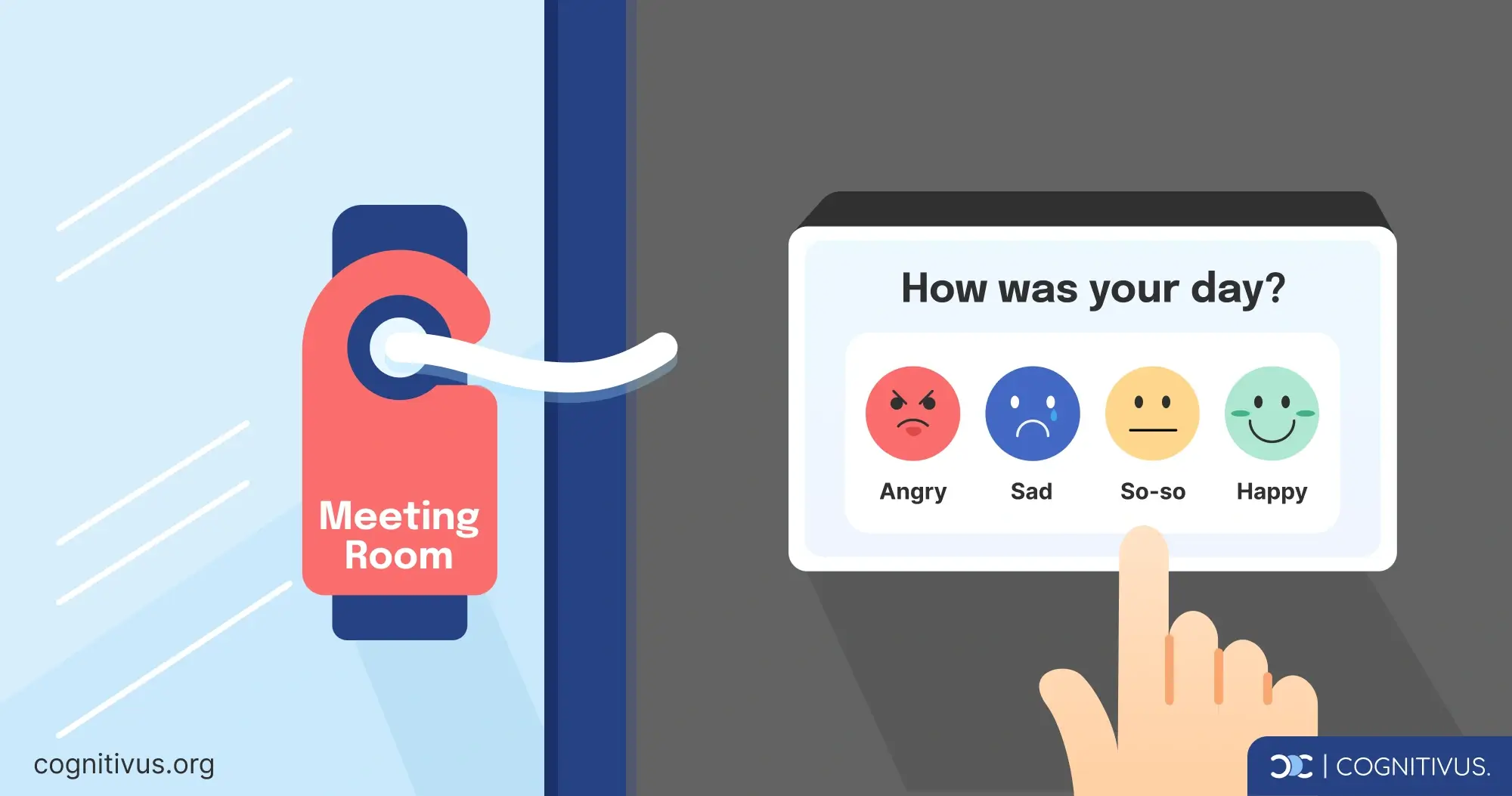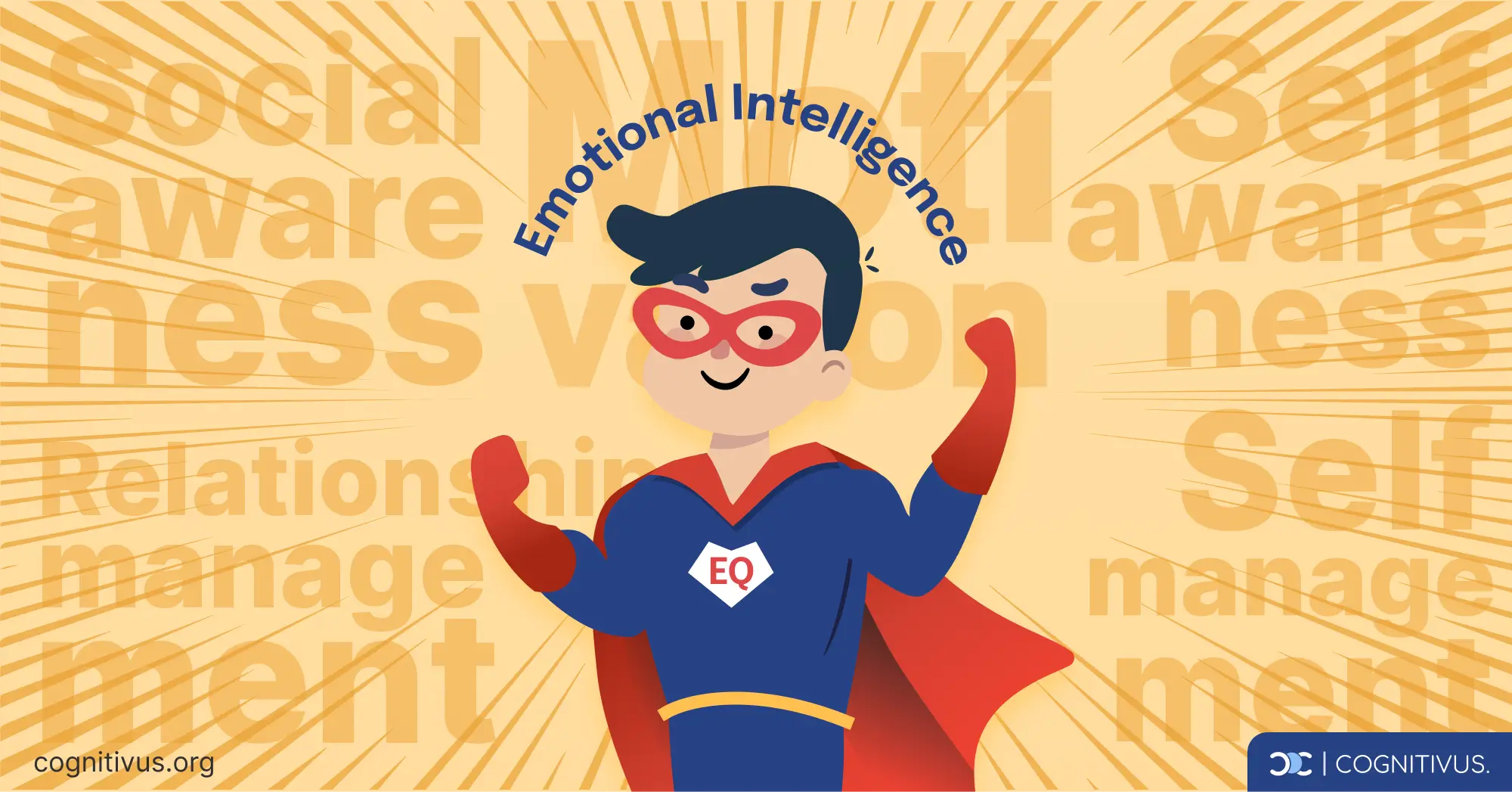Emotional Intelligence is a tangible skill that affects all areas of your life, from your friendships to your performance at work. That’s because it has everything to do with your emotional state and whether you’re capable of reading emotions and non-verbal cues when you communicate with other people.
To help you figure out why your emotional intelligence matters, we break down what Emotional Intelligence is, how it affects your everyday interactions and the life-changing steps you can take to improve it.
What Does Emotional Intelligence Mean?
Emotional Intelligence (EI) means being aware of your feelings and the feelings of others. It involves understanding your emotions in various situations and recognizing how your actions impact those around you.

Daniel Goleman, a well-known psychologist, and author, tells us that being smart with our emotions is just as important as being book smart if we want to be successful.
People with high emotional intelligence are good at self-awareness (understanding their own emotions) and social awareness (understanding others' emotions). These skills are essential for building relationships, making decisions, and handling stress.
How Important Is Emotional Intelligence?
Emotions drive your thoughts and actions, forming the basis for deep relationships, easing stress, and making wise choices. Emotional intelligence affects both your personal life and professional engagement. It enables you to collaborate effectively, showing patience, respect, and understanding.
Anyone can develop and improve their emotional intelligence, whether they are introverted, extroverted, or naturally kind. Improving emotional intelligence requires commitment and introspection – spending time understanding your feelings and the reasons behind them. Empathy plays a significant role in emotional intelligence, as it helps you understand others' emotions and perspectives.
Emotional intelligence at work
Think about the last time you worked in a team. How did everyone interact? Teams with high EI perform better because they respect each other's feelings and perspectives, especially during stressful times. This leads to better collaboration and faster achievement of objectives.
Boosting your EI at work helps you understand why people behave the way they do and how to respond appropriately. It also improves job performance. For example, according to research by Cary Cherniss from Rutgers University, the U.S. Air Force saved $3 million by recruiting individuals with high EI, and L'Oreal saw higher sales from sales reps chosen for their emotional intelligence.

According to the Center for Creative Leadership, 75 percent of careers are derailed due to a lack of emotional competencies. This includes an inability to handle interpersonal problems, poor team leadership during conflict, and difficulty adapting to change or gaining trust. Developing your team's emotional intelligence can elevate their performance to new heights.
Source: Center for Creative Leadership
Emotional intelligence in relationships
Your ability to handle and express your feelings affects how others respond to you. Emotional intelligence is about creating genuine connections based on understanding and respecting each other's feelings. Simple acts, like apologizing after an argument or celebrating a friend's success, show that you care.
In romantic relationships, high EI fosters intimate and lasting bonds. It enables partners to have difficult conversations and find solutions that address everyone's emotions. A good EQ makes love relationships deeper and more meaningful, especially during tough times.
The Building Blocks of Emotional Intelligence
To better understand emotional intelligence and how it can benefit you and those around you, let’s look at Daniel Goleman’s 5 building blocks of Emotional Intelligence:

Self-Awareness
Self-awareness is the first step in building your EQ. It's about understanding where your feelings come from. Think of it as observing your life from the outside. For example, if you’re having a bad day, take a moment to identify whether you’re tired, stressed, or hungry. Once you understand why you feel upset, you can take steps to address it, preventing unnecessary conflicts.
Self-Management
Self-management means controlling your emotions so they don’t lead to bad decisions. Instead of lashing out or responding sarcastically, stay calm under pressure. This approach not only prevents you from hurting others but also boosts your confidence in managing your life effectively.
Social Awareness
Social awareness is the ability to sense the mood in a room without anyone saying a word. This skill allows you to understand people’s unspoken feelings. Being socially aware helps you connect with others on a deeper level and respond appropriately to their emotions.
Relationship Management
Relationship management is crucial for building strong connections with others. It involves emotionally bonding with people, making it easier to understand their perspectives, whether they’re dealing with a work issue or a personal loss. In the workplace, effective relationship management helps you motivate your team and ensure everyone is aligned with the goals.
Motivation
Motivation, or intrinsic motivation, is the internal drive that pushes you to achieve your goals. It’s the inner force that keeps you going during tough times because reaching your objectives is important to you.
These five components of emotional intelligence – self-awareness, self-management, social awareness, relationship management, and motivation – are vital for dealing with your own emotions and effectively interacting with others. Developing these skills will help you navigate personal challenges and enhance your relationships, leading to a more fulfilling life.
How to Assess & Improve Emotional Intelligence?
The only way to determine which areas of your emotional intelligence need improvement is by assessing your EQ.
To make it easier, I provide an example of an appraisal to test your EQ in addition to steps to becoming more emotionally intelligent.
Assessing your EQ
Working on your emotional intelligence shouldn’t feel like ‘work.’ It should be a natural progression as you keep your emotions in check and make a concerted effort to understand the feelings of others. Increasing your EQ is about building skills that contribute to your overall emotional intelligence, which takes time and practice.
There are several ways to measure your EQ. The Emotional Intelligence Appraisal is an example of an assessment that looks at your EQ based on how well you know your emotions, how you manage these emotions, and how you deal with different people. It’s a useful and interesting way to let you know whether you’re on the right track to improving your EQ.
A simple tip to get the best results on these tests is to be honest in your responses. Because the questions are based on how you would react or feel in certain real-life scenarios, you’d only be cheating yourself if you don’t answer truthfully.
The purpose of these appraisals is to show you where your strengths lie and which aspects of your EQ need work. Remember that your EQ not only helps you get ahead in your personal life but also in your work life. Taking these steps gets you closer to overcoming life’s curveballs while making authentic connections that matter.
How to improve your emotional intelligence
You might not know this, but employers believe that one’s ability to deal with emotions constructively is more important than being highly intelligent. A survey by CareerBuilder showed that 71% of employers picked EQ over IQ.

People with high EQ, especially those in leadership roles, handle work-life challenges more effectively. They can resolve conflicts and reduce stress better.
Here’s how you can enhance your emotional intelligence:
- Live in the Moment
One of the simplest ways to boost your EQ is to practice mindfulness. Mindfulness helps you stay aware of your own feelings and the feelings of those around you. It prevents you from making assumptions or worrying about your reactions, as you learn to maintain control in various situations. - Ask for Feedback
Ask the people you trust for their opinions on your behavior and conversational skills, particularly in social situations. It’s nearly impossible to be objective when it comes to the way we present ourselves to other people. Receiving feedback from close friends and family improves your awareness and lets you know what you should work on. - Focus On How You Speak to People
Pay attention to how you communicate. Often, the tone and attitude you use can impact your message more than the words themselves. Always respect different perspectives and be mindful of nuances in conversations to respond appropriately and effectively. - Have Empathy
Empathy means putting yourself in someone else’s shoes and seeing things from their point of view. It’s one of the top strategies to improve your emotional intelligence. This process allows you to feel with them and better understand why they’ve made certain choices or think the way they do. - Be Accountable
Taking responsibility for your mistakes and admitting when you’re wrong is a significant step toward increasing your EQ. This shows emotional maturity and the ability to control your impulses. - Keep Learning
Emotional intelligence is not fixed; it can be developed over time. Explore online guides, articles, and EQ workshops to learn new skills and steps to improve your emotional intelligence. Even activities like listening to music can boost your emotional awareness and regulation. - Choose Your Words Wisely
The words you use daily reflect your emotional intelligence and can significantly influence how others perceive you. Your vocabulary can either build bridges or burn them. Speaking with compassion, empathy, and respect makes a positive, lasting impression. For example, phrases like “I understand how you feel” show empathy, while words like “You always” or “You never” can create defensiveness.
In addition to these strategies, there are other high EQ habits you can incorporate into your daily routine to further improve your emotional intelligence.



